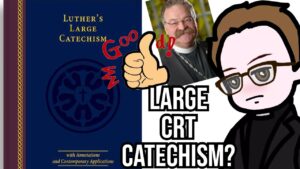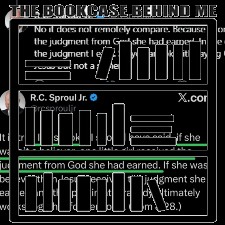Last week, the Lutheran Church-Missouri Synod (LCMS) became embroiled in controversy over the publication of a new Annotated Large Catechism by Concordia Publishing House (CPH). The book, which included essays and commentary alongside Luther’s Large Catechism text, drew criticism from some LCMS laymen who felt that certain passages promoted views at odds with Biblical and confessional Lutheranism, such as critical race theory, opposition to self-defense, denial of concupiscence, and improper roles for women.
In response, LCMS President Rev. Dr. Matthew C. Harrison initially requested that CPH pause distribution of the book in order to review the concerns. However, after about a week, President Harrison issued a statement saying that while some things could have been expressed more clearly, there was “nothing in the content of the volume promoting critical race theory (CRT), confusion of sexual issues or any theological position at odds with biblical and confessional Lutheranism.”
The Annotated Large Catechism has now been re-released, but the incident raises some troubling questions. While President Harrison claims that the book went through proper doctrinal review, it seems clear that at minimum, the controversial passages were worded ambiguously enough to cause widespread confusion and concern among laymen. If a resource meant to help teach and apply Lutheran doctrine to contemporary issues cannot do so clearly, that is a problem.
Even more concerning was President Harrison’s strong condemnation of the “unchristian attacks” made by those who raised the alarm about the book. A 3-hour discussion by concerned LCMS laymen thoughtfully critiqued the problematic essays, acknowledging the best construction one could put on them while still finding them severely lacking in clarity. These measured critiques were a far cry from “unchristian attacks.” To invite thoughtful criticism while at the same time demonizing those who offered it reveals a troubling double standard.
As a Lutheran in a different church body, I grieve for my friends in the LCMS who are discouraged by this turn of events. But it points to a hard reality – being in fellowship with church leadership that privileges institutional bylaws over clear biblical teaching, or that seems beholden to academic fads and cultural pressures more than faithful Lutheran doctrine, is untenable. There comes a point where one must assess whether they can, in good conscience, remain in communion with such a church body.
My intention is not to make that decision for anyone else, but simply to soberly reflect on the takeaways from this regrettable saga. I encourage everyone to thoughtfully review the evidence for themselves and consider what faithfulness looks like in their context. Above all, may Christ’s church be led by His Word alone as we await His return.






